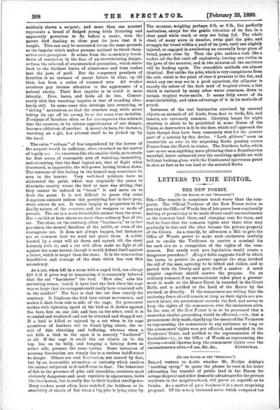LETTERS TO THE EDITOR.
THE NEW FOREST.
[To THE EDITOR OF THE .4 SPECTATOR.") Sin,—The remedy is sometimes much worse than the com- plaint. The Official Verderer of the New Forest writes to you that the Office of Woods has of late years been continually making or permitting to be made divers small encroachments on the common land there, and charging rent for them, and that he fears that the common rights over these sites may gradually be lost and the sites become the private property of the Crowu. As a remedy, be advocates a Bill to give the Office of Woods power to make such enclosures lawfully and to enable the Verderers to receive a nominal fee for each site as a recognition of the rights of the com- moners. But surely such new legislation would create a dangerous precedent ? -6Esop's fable suggests itself in which the horse, to protect its pasture against the stag, invoked the aid of the man, agreeing to be bitted and ridden, and so parted with its liberty and gave itself a master. A much simpler expedient should answer the purpose. On an ordinary common if an encroachment takes place a present- ment is made at the Manor Court, is recorded in the Court Rolls, and is notified to the Lord of the Manor by the steward, or directly. If the commoners are willing that the enclosing fence should remain so long as their rights are pre- served intact, the presentment records the fact, and serves to keep the rights of the commoners over the enclosures alive. In the case of the New Forest it is to be presumed that a somewhat similar proceeding would be effectual,—viz., that a presentment duly made, signifying the assent of the Verderers as representing the commoners to any enclosure so long as the commoners' rights were not affected, and recorded in the Verderers' Court, and notified to the representative of the freeholder—i.e., to the Office of Woods as representing the Crown—would likewise keep the commoners' rights over the encroachments alive.—I am, Sir, &e., SENESCHAL.






































 Previous page
Previous page